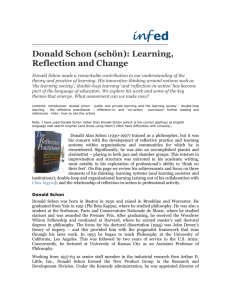Introduction to Critcal Reflection
advertisement
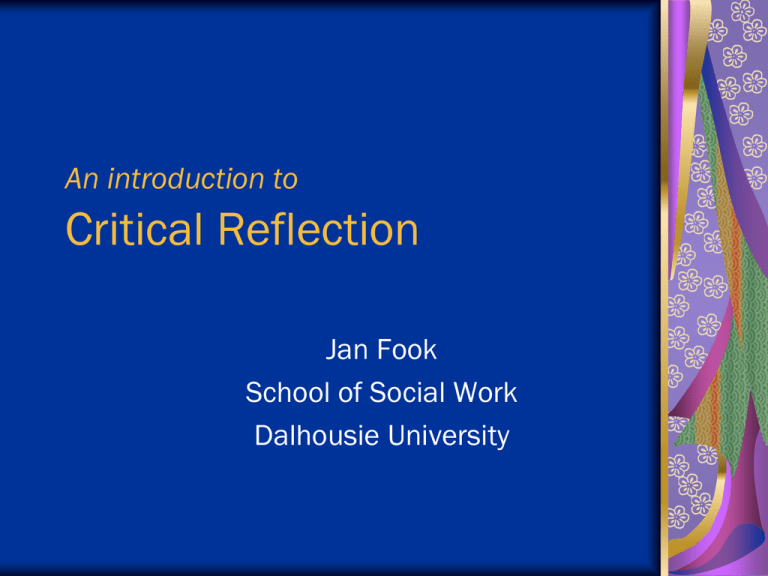
An introduction to Critical Reflection Jan Fook School of Social Work Dalhousie University Why critical reflection? Is everyone here reflective? Does anyone know someone else who is not reflective? Is everyone here critically reflective? Does anyone here know someone else who is not critically reflective? DOES IT MATTER? A sceptical voice….. Does anyone not reflect? Do we really know what it means (in practical terms)? Is it possible to pinpoint in concrete terms how it changes your actions? How do you do it when most workplaces are too busy, and bureaucracy and outcome led? Many challenges for all professionals….. Contexts of uncertainty, unpredictability, complexity Increasing demands on professionals Accountability and effectiveness in uncertainty? The need for values Therefore…… THE ABSOLUTE NECESSITY OF CRITICAL REFLECTION……. which is: Structured Practical Meaningful Speaks to workplace demands What is critical reflection? Learning from/making (positive) meaning of experience (eg.Dewey, Boud, Mezirow) (we all do it but may not be aware of it, but there are better and worse ways of doing it) Process of unearthing deeper assumptions (eg. Schon) (not as easy to do as it looks) What makes it critical – unearthing fundamental (dominant) assumptions about power– “ideology critique” (eg. Brookfield) (good PC analysis but not always where people are at?)…THE PROBLEM OF POWER AND TRANSFORMATION?? What is it? Learning from experience (Dewey, Boud) What is learning? Learning which is adaptive (not restrictive) Transferable between contexts Makes meaning – Provides a framework of guidance for further living) – Integrates past experiences into coherent sense of self What is experience? A holistic amalgam of thoughts, feelings, actions and meaning Both “sensed” and “theorised” Both personal and social How is critical reflection done? It uses a (reflective) process of uncovering and unsettling (fundamental) hidden or implicit assumptions (ie. the “taken for granted”) (Schon) (especially as they relate to how power is created or maintained) (Brookfield) …..therefore…. ..therefore we should be able to…. Identify and examine the bases of our practice (critical ability) Link our personal experiences (practice) with an understanding of how our the broader social/political context influences them (critical ability) …..therefore… ..we should be able to… Understand and analyse our own experiences in relation to: broader policies, the expectations of our organisation or profession expectations, expectations of the wider society or culture, the historical context, gender or race relations, etc. (critical ability) …we can also… Recognise many and different perspectives or interpretations of a situation and accept contradictionsbetween them (post-modern/ constructivist influence) Recognise the influence of many facets of ourselves (personal, professional, social) on situations (knowledge and interactions) and vice versa (reflexivity) Connects awareness and action and envisages new possibilities for action (critical ability) My version… Involves both theory and practice: a clear rationale and analysis and.. A clear and structured process for conducting it Aims of critical reflection… To learn from experience and therefore to improve practice (by learning directly from own practice experience) The process involves…. engaging in a process of examining the fundamental assumptions implicit in practice experience (this often leads to a re-examination of past experience (and meanings) in the light of current contexts) And devising changed thinking and practices from this new awareness ….And a new way of framing (past and present) experience Can be used for…. Learning from experience and creating practice theory and meaning from it Ongoing scrutiny of practice A form of accountability/supervision A form of personal, professional and organisational learning A form of research Can therefore be theorised in a whole variety of ways…………………… Relevat theories/concepts Reflective practice Reflexivity Postmodernism/the linguistic turn Critical social theories Spirituality and eastern religions Related theories Reflective practice – the gap between theory and practice (eg. Schon) Postmodernism/deconstruction/the linguistic turn – how our language/discourse constructs our knowledge Reflexivity – how who we are (socially and personally) constructs our knowledge (eg. Taylor and White) Critical perspectives - how personal experience is linked with social/power arrangements, and how social Reflective practice Gap between theory and practice, between implicit and explicit ideas The limitations of explicit rules or theory The need to create theory (practice) in context How our practice actually creates knowledge Reflexivity – how who we are personally and socially constructs the way we see and act in the world The mirror We ourselves are instruments for creating knowledge, therefore who we are (all aspects) has a role in how we see/understand the world physical, emotional, social, historical, structural influences in shaping knowledge Postmodernism/deconstruction/the linguistic turn How we speak about things constructs the way we see/understand them – some things are left out; others are constructed as binary categories There may be many different (and contradictory ways of seeing things) How things are see often has to do with POWER Critical social theories how personal experience is linked with social/power arrangements, and how social awareness leads links with social change (eg. Brookfield) Recognises that power is both personal and social and they are linked Individuals can hold social beliefs Understanding the link is important in making social changes Spirituality and eastern religions The making of greater meanings, based on holistic connectedness and interconnectedness between individuals experiences and the greater worlds in which they live Eg. Concept of mindfulness The transformative potential of critical reflection? Can free us from the restrictive learning of past experiences towards more creative practice Recognising and naming deep taken for granted assumptions effectively reduces their power Enables more conscious choice (power) Reveals how some assumptions we hold can work to disempower ourselves or others Basic method/process Focuses on: Specific instances of practice (critical incidents) To unsettle (dominant) implicit assumptions (stage 1) In order to discover and change relevant thinking and practices (stage 2) Uses critical reflective questions derived from theories May be used in a number of ways (eg. Small groups, self-reflection) In an ethical learning climate The generic process Use critical incident description and critical reflective questions to: Stage 1 Identify our hidden theories (or assumptions), particularly as they relate to power Examine where these come from, and how they are relevant to our current situation Stage 2 Identify what we think needs to change about the way we think or work (as a result of being aware of these deep assumptions) Devise a label for this new way of thinking/working (ie. reformulate our new theory of practice) Critical reflective questions: reflective what are my implicit assumptions and how do they differ from my explicit ones How can I use this awareness to change my practice? Eg. what does my practice imply about my fundamental values? What am I assuming about the nature of human beings? Society? power and conflict? Reflexive questions How do I influence what I see? How does what I am looking for influence what I find? how does who I am influence the way I see things? How do my past experiences contribute to my biases? Do my own needs cause any “blind spots”? Postmodern/deconstructive How does my language construct what I see? Eg. What particular words or phrases do I use? What do these indicate about the way I see things? What(or whose perspectives) am I leaving out? Why have I chosen one way of interpreting over another? Why did I choose this action (and not another?)What binaries exist? Critical questions How do I participate in power? What are the connections between my personal experience and my social context? And how can I change my practice with this awareness? Eg. what self-defeating beliefs do I hold? Do I see myself as powerless? How do I see other people’s power? How do I understand responsibility? What do I believe about how organisational and personal power is connected? Stage 2 questions What are my main assumptions? How does my thinking change as a result of being aware of these? How does my practice need to change as a result? How would I relabel my personal “theory of practice”? Critical incident An event which is significant in some way to the learner/participant Descriptive and basic as possible Used as “raw” material for reflection The ethcal learning climate of “critical acceptance”(Safe climate to enable challenge) Trust & respect Acceptance NOT affirmation Focus on professional learning Right to draw limits Focus on story or construction Openness to multiple and contradictory perspectives Responsibility (agency) not blame An example of critical reflection… Barbara….. A social worker/manager in a large government bureaucracy Incident from personal life – she intervenes between 2 men in angry argument Didn’t want to be a ‘control freak’ Assumptions about control, someone needing to be in control, and equated with the need for action Reflected on her own needs to be in control and assumptions about good professional practice equated with need to take action Barbara…cont…. Fear of uncertainty? Emotions and assumptions come together in the experience…… Caught herself telling a staff member that he needed to “stay with the uncertainty”…. Stage 2….. Therefore a need to reconstruct her desired practice as “being powerful in uncertainty” or “structured uncertainty” She spoke of creating her own “emotional scaffolding” to help her in new situations Using this critical reflection process in supervision One to one Diaries Group/peer supervision Researching practice Benefits and outcomes of critical reflection Rational Emotional Values Practice Rationality Better able to abstractify and understand theory More considered and evidence-based Better decision-making and more choice Better able to work with uncertainty and multiple perspectives Self and emotions Increased self awareness Overcome personal blocks Resolve dilemmas Recognise and use power of emotion Value-based practice More inclusive (less judgemental) Able to recognise different perspectives more awareness of personal agency ie. empowerment Direct links with practice Enhanced sense of professionalism Better connected with colleagues Practice not entirely solution-focused leads to better sense of having skills Better integration of personal/professional Better ability to learn from practice References Fook, J. & Gardner, F. (2007) Practising Critical Reflection, Open University Press, Maidenhead Fook, J. & Gardner, F. (eds) (2013) Critical Reflection in Context, Routledge, London
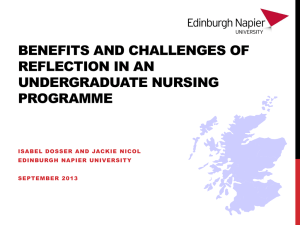

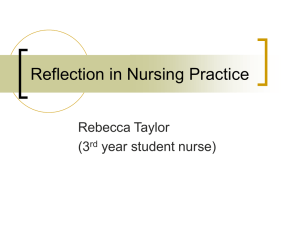
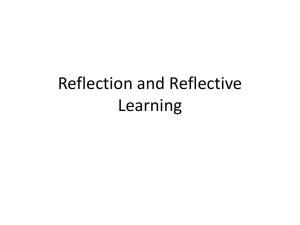

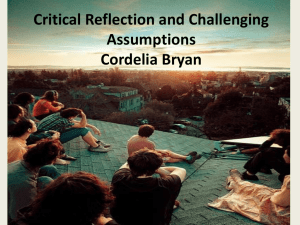
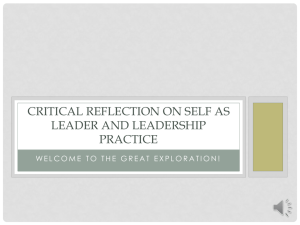
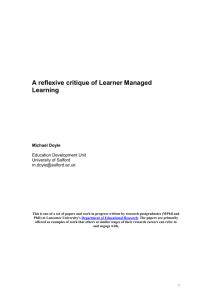
![Reflexivity in Academic Research [.PPT]](http://s2.studylib.net/store/data/005467615_1-5f1ed51efa2e2c6daa464b130d515ef6-300x300.png)
